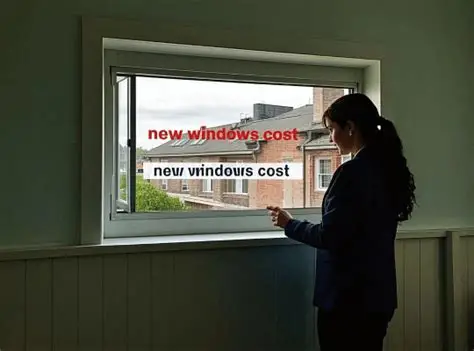When considering new windows for your home, understanding the cost implications is crucial. From the materials used to the installation process, every detail impacts the final price tag. Let's delve into the world of new windows cost and uncover the key factors that influence pricing.
As we navigate through the different aspects of new windows cost, you'll gain valuable insights to help you make informed decisions for your home improvement project.
Factors Affecting New Windows Cost
When considering the cost of new windows, there are several factors that can influence the overall price. These factors include the materials used, the size of the windows, the style chosen, and the complexity of the installation process. Additionally, geographical location and local market conditions can also play a significant role in determining the cost of new windows.
Window Materials
The choice of materials for new windows can greatly impact the cost. Here is a comparison of costs for various window materials:
- Vinyl: Vinyl windows are usually the most cost-effective option, making them a popular choice for budget-conscious homeowners.
- Wood: Wooden windows tend to be more expensive due to the higher cost of materials and maintenance required.
- Aluminum: Aluminum windows are moderately priced and offer durability, making them a good option for areas with harsh weather conditions.
- Fiberglass: Fiberglass windows are on the higher end of the price spectrum but are known for their longevity and energy efficiency.
Size and Style
The size and style of the windows can also impact the cost. Larger windows or custom-designed styles may require more materials and labor, resulting in a higher price tag.
Installation Complexity
The complexity of the installation process can affect the cost of new windows. Factors such as the need for structural modifications, accessibility issues, or specialized equipment can increase the overall price of installation.
Geographical Location and Local Market
Lastly, the geographical location and local market conditions can influence the cost of new windows. Areas with higher demand for window replacement services or higher costs of living may have higher prices for new windows compared to regions with lower demand.
Average Cost Estimations
When it comes to replacing windows, the cost can vary depending on factors such as size, material, and additional expenses. On average, homeowners can expect to pay between $300 to $1,000 per window for standard sizes and common materials.Energy-efficient windows, while initially more expensive, can lead to long-term savings on energy bills.
These windows are designed to better insulate your home, reducing the need for heating and cooling, ultimately lowering your utility costs.
Standard Window Sizes and Materials
- Standard vinyl windows: $300 - $700 per window
- Standard wood windows: $500 - $1,000 per window
- Standard aluminum windows: $400 - $800 per window
Additional Costs
- Labor costs: $50 - $100 per hour, depending on the complexity of the installation
- Permit fees: $100 - $300, depending on your location
- Disposal fees: $50 - $100 for removing and disposing of old windows
Single Window vs. Multiple Windows
When replacing a single window, the cost may be higher per window due to the setup and labor involved. However, replacing multiple windows at once can often result in a lower cost per window, as the labor and setup costs can be spread out across all the windows.
Cost-Saving Strategies
When it comes to saving on new windows costs, there are several strategies that homeowners can consider to make the project more budget-friendly. From buying windows in bulk to exploring financing options, there are various ways to reduce the overall expense of installing new windows.
Buying in Bulk or During Off-Season Sales
One cost-saving strategy is to purchase windows in bulk or take advantage of off-season sales. Buying multiple windows at once can often result in discounts from suppliers or manufacturers
. Additionally, shopping for windows during off-peak seasons when demand is lower can also lead to savings as retailers may offer promotions to clear out inventory.
DIY Installation vs. Professional Installation
While opting for do-it-yourself (DIY) installation can help lower costs by eliminating labor fees, it's essential to consider the drawbacks. Improper installation can lead to air leaks, drafts, and reduced energy efficiency, ultimately costing more in the long run. Homeowners should weigh the cost savings against the potential risks and consider hiring professionals for a flawless installation.
Financing Options and Rebates
Exploring financing options such as loans or payment plans can make the upfront cost of new windows more manageable. Some manufacturers or government programs also offer rebates or incentives for energy-efficient windows, allowing homeowners to recoup some of the expenses through savings on energy bills.
It's worth researching these opportunities to maximize cost savings.
Window Replacement Process
When it comes to replacing windows, the process involves several crucial steps to ensure a successful and efficient outcome. Proper measurements and professional installation are key factors that can greatly impact the overall cost and quality of the project.
Importance of Proper Measurements
- Accurate measurements are essential to ensure that the new windows fit perfectly into the existing openings.
- Incorrect measurements can lead to costly mistakes and delays in the installation process.
- Professional window installers typically take precise measurements to guarantee a seamless fit and optimal performance.
Professional Installation
- Professional installation is crucial for ensuring that the windows are properly installed and sealed to prevent air leaks and water infiltration.
- Improper installation can result in drafts, energy loss, and potential damage to the windows.
- Hiring experienced installers with the necessary skills and knowledge can help avoid costly repairs and replacements in the future.
Common Challenges and Unexpected Costs
- Unexpected structural issues, such as rot or water damage, may be uncovered during the window replacement process, leading to additional repair costs.
- Unforeseen complications, like the need for custom-sized windows or extensive framing work, can increase the overall project expenses.
- Delays in the delivery of windows or inclement weather conditions can also impact the timeline and budget of the replacement project.
Warranties and Guarantees
- Some window manufacturers offer warranties that cover defects in materials or workmanship, providing added protection and peace of mind for homeowners.
- Extended warranties or guarantees on installation services may influence the overall cost but can be beneficial in the long run by ensuring quality craftsmanship and product performance.
- Understanding the terms and conditions of warranties can help homeowners make informed decisions and protect their investment in new windows.
Closing Summary
In conclusion, new windows cost is a multifaceted subject that requires careful consideration. By weighing factors like materials, estimates, savings strategies, and the replacement process, you can embark on your window upgrade journey with confidence.
Essential Questionnaire
What factors can influence the cost of new windows?
Factors such as materials, size, style, installation complexity, geographical location, and local market conditions can all impact the cost of new windows.
Are there any additional costs besides the actual window price?
Additional costs may include labor, permits, disposal fees, and any upgrades or customizations you choose for your windows.
How can homeowners save on new windows costs?
Homeowners can save by buying in bulk, taking advantage of off-season sales, considering energy-efficient options for long-term savings, and exploring financing options or rebates.
What are the key steps in the window replacement process?
The window replacement process typically involves measurements, professional installation, potential challenges, unexpected costs, and warranties or guarantees that may affect the overall cost.














